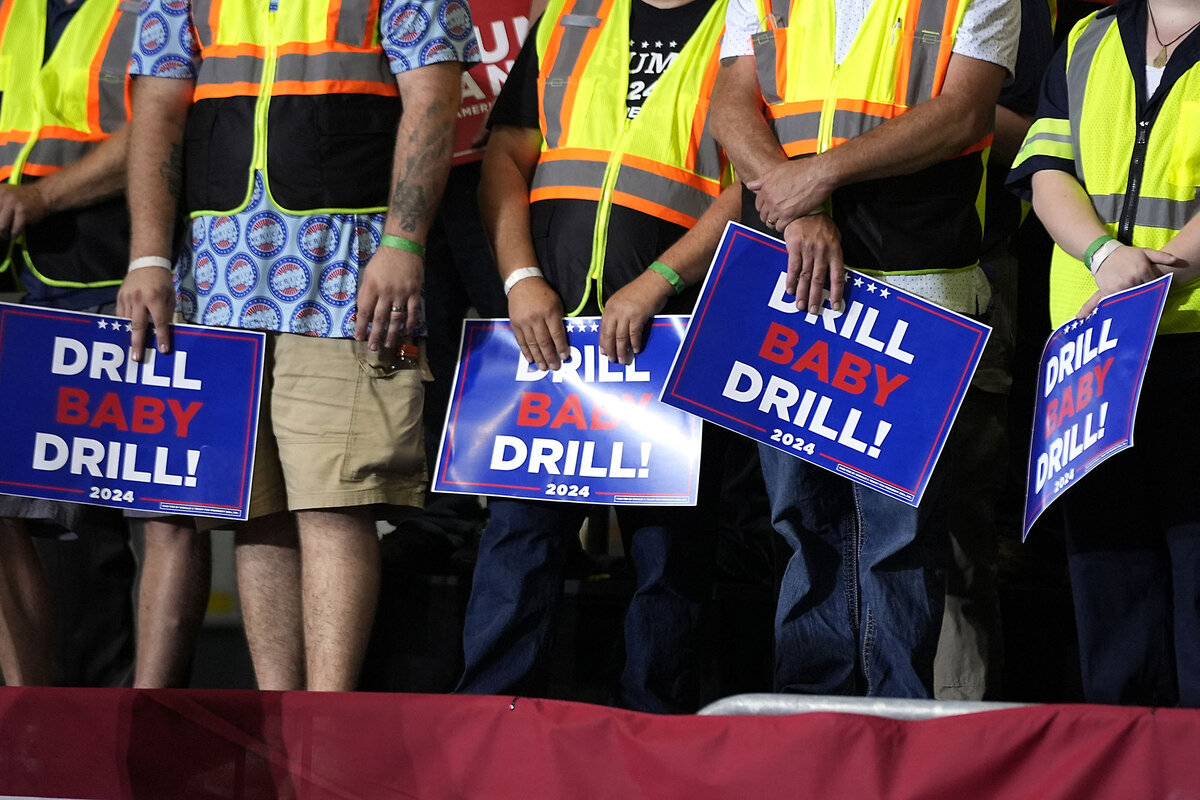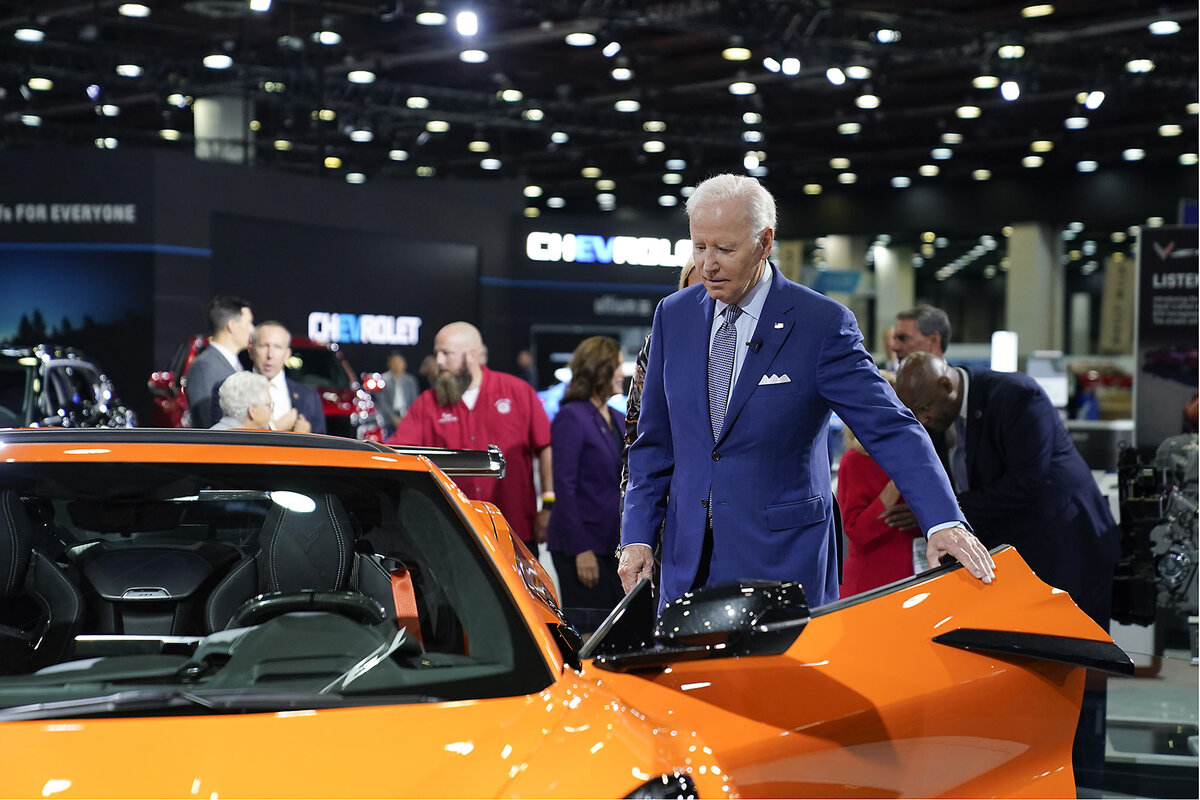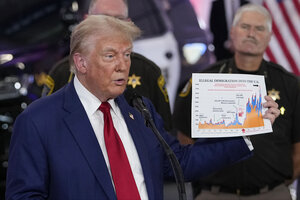A lesson of Election 2024: There is no ‘climate voter’
Loading...
The next president of the United States will be someone who campaigned on relying more on fossil fuels, not less.
That result may seem counterintuitive, given that most Americans see climate change as a threat and believe human actions are the cause of it.
Why We Wrote This
Polls show most Americans view climate change as a threat, but they put pocketbook concerns first. A test for whether the clean energy transition can succeed is by tying it to economic benefits.
But it’s also not surprising, say many who study the issue. Multiple studies have shown that most voters rank climate or energy policy well below economic concerns and other social issues when it comes to picking political candidates.
This election proved that there “is no ‘climate voter,’” says Roger Pielke Jr., a professor at the University of Colorado Boulder, and a nonresident senior fellow at the conservative American Enterprise Institute who has long written about climate change and policy.
“It’s up there, but it’s nowhere near immigration, inflation, the economy, and things like that,” he says.
To some extent, the nation’s transition toward cleaner energy sources is already resting on a financial rationale that goes beyond the goal of reducing greenhouse gas emissions. Solar and wind power are economically competitive with fossil fuels.
For people who rank climate change high on their list of societal concerns, the Nov. 5 election result was a sobering one: The next president of the United States will be someone who campaigned on relying more on fossil fuels, not less.
That result may seem counterintuitive, given that most Americans see climate change as a threat and believe human actions are the cause of it.
But it’s also not surprising, say many who study the issue. Multiple studies have shown that most voters rank climate or energy policy well below economic concerns and other social issues when it comes to picking political candidates.
Why We Wrote This
Polls show most Americans view climate change as a threat, but they put pocketbook concerns first. A test for whether the clean energy transition can succeed is by tying it to economic benefits.
This election proved that there “is no ‘climate voter,’” says Roger Pielke Jr., a professor at the University of Colorado Boulder and a nonresident senior fellow at the conservative American Enterprise Institute who has long written about climate change and policy.
He and political scientist Ruy Teixeira, another American Enterprise Institute fellow, conducted a survey of voters in September and found that even those who list climate as an important issue are generally unwilling to pay extra for it.
“It is important,” says Dr. Pielke of voter opinions on climate change. “It’s up there, but it’s nowhere near immigration, inflation, the economy, and things like that.”
Climate and clean energy are important priorities, he says. But putting them into the context of economic prosperity is a far more effective approach than putting the climate goals at the forefront.
To some extent, the nation’s transition toward cleaner energy sources is already resting on a financial rationale that goes beyond the goal of reducing greenhouse gas emissions. Solar and wind power are economically competitive with fossil fuels.
If climate advocates are reeling from the election of Donald Trump to a second term, many also hope that the country’s transition toward clean energy has become economically powerful enough to withstand a change in political power.
Indeed, the economic and energy landscape Mr. Trump is inheriting in 2024 is fundamentally different than it was in 2016, many experts say. The past eight years have seen a dramatic expansion in both solar power and other renewable technologies, as well as a growing recognition among automakers and other manufacturers that if the U.S. does not make big gains in “green” technology, the country will find itself losing even more market share to China.
“There should be nothing partisan or political about creating jobs or driving economic growth or making our air and our water a little cleaner for all of us,” says Bob Keefe, the executive director of E2, a nonpartisan group of business leaders advocating for a clean economy.
Still, throughout his campaign, Mr. Trump criticized the climate policies of the Biden administration, particularly incentives for electric vehicles. His promises of “drill baby, drill” reflect his goal of ramping up oil and gas production, even more so than the record levels under the Biden administration. He has also pledged to roll back clean power regulations.
Perhaps most influentially, Mr. Trump has talked about repealing the $437 billion Inflation Reduction Act, which he has blamed for inflation and described as the “green new scam.” But the realities of what he can – or will want to – do with that legislation is complicated.
More than 80% of the clean energy investments catalyzed by the Inflation Reduction Act – into everything from new battery or electric vehicle factories to “green cement” projects or solar plants – have gone to Republican districts. In August, a group of 18 GOP representatives sent a letter to Speaker of the House Mike Johnson, urging him to “prioritize business and market certainty as you consider efforts that repeal or reform the Inflation Reduction Act.”
While the group criticized the partisan passage of what it called a “deeply flawed bill,” the representatives also pointed out that “Energy tax credits have spurred innovation, incentivized investment, and created good jobs in many parts of the country – including many districts represented by members of our conference. ... As Republicans, we support an all-of-the-above approach to energy development and tax credits that incentivize domestic production, innovation, and delivery from all sources.”
The business outlook
Businesses, meanwhile, want a stable regulatory environment, says Anne Kelly, vice president for government relations at Ceres, a nonprofit and business network working on clean economy transitions. Although Mr. Trump has criticized global climate pledges and national emissions standards, those policies have kept American businesses competitive internationally.
“Businesses want certainty and predictability, and many of them have already committed to climate transition action plans,” Ms. Kelly says. “They’re already being pressured by certain European rules and regulations. ... And so, to suddenly have the U.S. jump out of the global arena – it just makes no sense. It’s disruptive.”
Scores of environmental organizations put out postelection statements criticizing Mr. Trump’s prior positions on climate change and urging increased advocacy. Yes, clean energy is good for the economy, many indicated. But addressing climate change is also important for far larger reasons.
“A changing climate affects everyone, regardless of political affiliation, and what happens over the next four years is of profound importance if we are to head off the worst harms of a warming world,” Environmental Defense Fund President Fred Krupp and Executive Director Amanda Leland said in a joint statement after the election. “The climate crisis requires seriousness and urgency – and it requires holding our government accountable. This fight is about protecting who and what we love.”
Still, if clean energy boosters see momentum behind renewable sources, they also say the policy choices under a new administration will matter.
“Will Trump slow the growth of clean energy in America and set us back in climate? Probably, but he won’t kill it,” Mr. Keefe says. “If you look at any poll of what people want in clean energy and climate action from the federal government, Republican, Democrat, whatever, they want our country to do more. The momentum is there. The need is there. The technology is there now, and the desire is there. I just hope the new president builds on that and doesn’t tear it down.”
Editor’s note: This article, originally published Nov. 8, was updated to correct the spelling of Ruy Teixeira’s name.



















